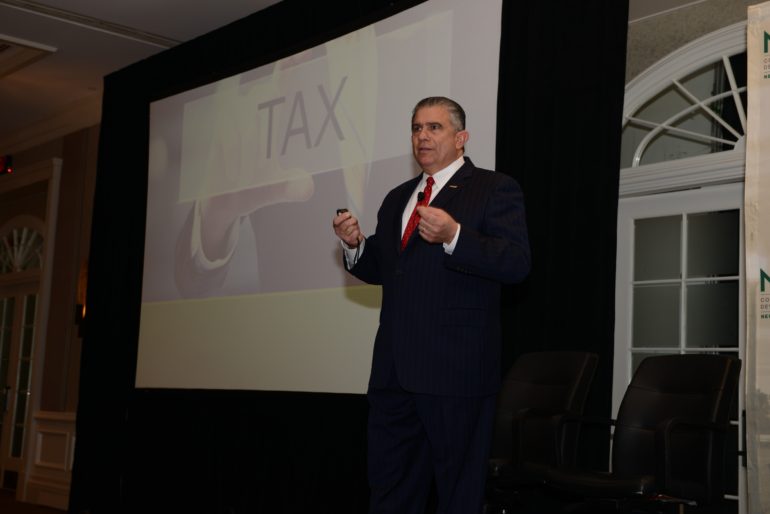Tom Bisacquino, NAIOP national president, speaking at NAIOP New Jersey’s recent commercial real estate outlook event — Photo by Gary Gellman/Courtesy: NAIOP New Jersey
By Joshua Burd
Experts believe the reforms will spur additional growth during an expansion that will soon be the second-longest in U.S. history, thanks in part to a sweeping cut to the corporate tax rate from 35 to 21 percent.
That bodes well for New Jersey’s office and industrial landlords.
“The old adage in our industry is what? A landlord cannot do better than his or her tenant,” Tom Bisacquino, NAIOP’s national president, said Jan. 22 during NAIOP New Jersey’s annual meeting and outlook event.
“So if it’s good for corporate America, if we believe that corporate America will expand and prosper under this bill, it should have a very positive effect on the demand for our space.”
The appetite for industrial space in New Jersey is already at unprecedented levels, as e-commerce firms and others seek to capitalize on the state’s access and gain a foothold within the nation’s densest consumer market. The office sector, however, is not riding nearly as high: Urban and downtown submarkets in the state have grown in recent years, but a glut of obsolete suburban office space has kept overall vacancy well above 20 percent in northern and central New Jersey.

At the same NAIOP event, CBRE’s Spencer Levy said he believes the new federal tax reform would provide a boost to commercial landlords, but also tempered those expectations.
“Everybody that’s in this room in office and industrial is hoping that you benefit,” said Levy, CBRE’s head of research for the Americas. “And you should — if the plan does what it’s supposed to do, which is stimulate growth by having more liquidity, more money coming back and a lower cost of capital by lower tax rates.
“The cautionary note is that the United States economy has not been lacking liquidity or low-cost capital for the last five years and it still grew slowly. So I believe it will, but that’s the counterpoint.”
Experts also note that a rise in interest rates could temper some of that growth. And while the tax reform plan may extend the current recovery, Jeff Otteau, president of Otteau Valuation Group, warned that it could also result in a bigger correction when the time comes for another downturn.
He pointed to one other major long-term concern: New Jersey residents may have more money in their pockets, but the savings pale in comparison to what they would achieve if they lived in another state. Because of the high cost of living in the Garden State, he said most other states are benefiting about two or three times from the fruits of the tax reform bill.

That could accelerate New Jersey’s growing outmigration crisis, Otteau said. It could also make the state less competitive in the years to come, as it will widen the gap between the wages that employers must pay in order to locate in New Jersey versus lower-cost regions.
That could be especially pronounced, given the global, mobile nature of today’s economy.
“Cost containment is one of the most important aspects for large businesses today,” Otteau said. “And, if as a result of being in New Jersey, you’re paying significantly higher wages in order to be able to recruit and retain a talented workforce than your competitor in North Carolina is paying, then you are less competitive than your competitor.”
Others have raised concerns about affordability in New Jersey in the wake of the tax reform law.
David Brogan, the executive director of the New Jersey Apartment Association, said last month that the federal Low Income Housing Tax Credit program could suffer amid cuts to the corporate and income tax rates. He said the program, the largest source of funding for affordable housing projects across the country, allocates credits to affordable housing developers that they can then sell to generate private investment in their projects.

“The benefit to the developers is the influx of much needed capital to pay for the construction of the project,” Brogan wrote in a Jan. 18 post on RE-NJ.com. “Given that the value of the tax credit is tied to federal tax policy, the recent reduction of both the corporate business tax and the income tax rates lead many to believe that the value of, and demand for, the LIHTCs will drop.
“Less demand means less funding. Less funding means less affordable housing development.”
When it came to affordability for businesses, Levy of CBRE seemed less concerned about the long-term impact of the tax reform law. He conceded that markets such as New Jersey, New York, California and Chicago “were high-cost places to do business yesterday and they’re going to be high-cost places to do business tomorrow,” but argued that those costs wouldn’t stop companies from locating in those markets.
“That’s not why they’re coming here,” Levy said. “They’re coming here for the same reasons they’re going to most markets. They want talent. They want live-work-play environments. They want infrastructure. New Jersey has those things in spades.”
Case by case
It’s clear that the Tax Cuts and Jobs Act is a boon to real estate developers and owners. Exactly how to realize those benefits is slightly more complicated.
According to accountants, the formula for unlocking the advantages relies on many more variables than it did under the previous tax code — from rules surrounding business interest deductions and depreciation to limits on business losses that can be counted against one’s income.

“Before, you could generically say, ‘This impacts everybody this way,’ said Michael Benguigui, a senior manager in Sax’s real estate practice. “Now, with this tax reform and how things are shaking out — and how one thing impacts another part of the legislation — no longer is that statement true.
“Everything now needs to be planned according to every fact pattern. Every situation is different and everyone is going to get a different result.”
To George Livanos, the benefits can depend on the size and scope of the developer and its portfolio. Some clients who “may be building a portfolio and generating losses” may be limited in how much they benefit from the new tax code, while more established companies stand to gain significantly in the near term.
“The more mature owner-operator developers and large families who own a significant amount of real estate in our state — they will benefit tremendously,” said Livanos, a partner in Sax LLP’s real estate practice. “And then for the ones in the middle, it’s really going to be a function of what their goals are: Am I a fund? Am I an institutional investor? Am I a young entrepreneur starting out in the business?
“Everybody’s calculus is going to be different by virtue of the after-tax yields on their property over that specific holding period.”










